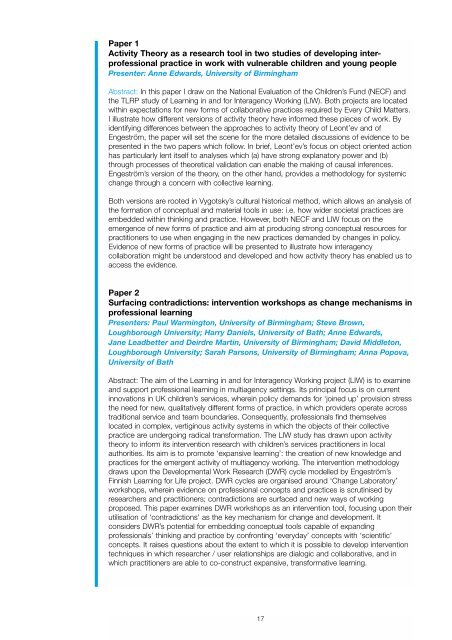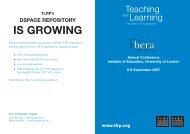Bera Booklet 2005 - Teaching and Learning Research Programme
Bera Booklet 2005 - Teaching and Learning Research Programme
Bera Booklet 2005 - Teaching and Learning Research Programme
- No tags were found...
Create successful ePaper yourself
Turn your PDF publications into a flip-book with our unique Google optimized e-Paper software.
Paper 1Activity Theory as a research tool in two studies of developing interprofessionalpractice in work with vulnerable children <strong>and</strong> young peoplePresenter: Anne Edwards, University of BirminghamAbstract: In this paper I draw on the National Evaluation of the Children’s Fund (NECF) <strong>and</strong>the TLRP study of <strong>Learning</strong> in <strong>and</strong> for Interagency Working (LIW). Both projects are locatedwithin expectations for new forms of collaborative practices required by Every Child Matters.I illustrate how different versions of activity theory have informed these pieces of work. Byidentifying differences between the approaches to activity theory of Leont’ev <strong>and</strong> ofEngeström, the paper will set the scene for the more detailed discussions of evidence to bepresented in the two papers which follow. In brief, Leont’ev’s focus on object oriented actionhas particularly lent itself to analyses which (a) have strong explanatory power <strong>and</strong> (b)through processes of theoretical validation can enable the making of causal inferences.Engeström’s version of the theory, on the other h<strong>and</strong>, provides a methodology for systemicchange through a concern with collective learning.Both versions are rooted in Vygotsky’s cultural historical method, which allows an analysis ofthe formation of conceptual <strong>and</strong> material tools in use: i.e. how wider societal practices areembedded within thinking <strong>and</strong> practice. However, both NECF <strong>and</strong> LIW focus on theemergence of new forms of practice <strong>and</strong> aim at producing strong conceptual resources forpractitioners to use when engaging in the new practices dem<strong>and</strong>ed by changes in policy.Evidence of new forms of practice will be presented to illustrate how interagencycollaboration might be understood <strong>and</strong> developed <strong>and</strong> how activity theory has enabled us toaccess the evidence.Paper 2Surfacing contradictions: intervention workshops as change mechanisms inprofessional learningPresenters: Paul Warmington, University of Birmingham; Steve Brown,Loughborough University; Harry Daniels, University of Bath; Anne Edwards,Jane Leadbetter <strong>and</strong> Deirdre Martin, University of Birmingham; David Middleton,Loughborough University; Sarah Parsons, University of Birmingham; Anna Popova,University of BathAbstract: The aim of the <strong>Learning</strong> in <strong>and</strong> for Interagency Working project (LIW) is to examine<strong>and</strong> support professional learning in multiagency settings. Its principal focus is on currentinnovations in UK children’s services, wherein policy dem<strong>and</strong>s for ‘joined up’ provision stressthe need for new, qualitatively different forms of practice, in which providers operate acrosstraditional service <strong>and</strong> team boundaries. Consequently, professionals find themselveslocated in complex, vertiginous activity systems in which the objects of their collectivepractice are undergoing radical transformation. The LIW study has drawn upon activitytheory to inform its intervention research with children’s services practitioners in localauthorities. Its aim is to promote ‘expansive learning’: the creation of new knowledge <strong>and</strong>practices for the emergent activity of multiagency working. The intervention methodologydraws upon the Developmental Work <strong>Research</strong> (DWR) cycle modelled by Engeström’sFinnish <strong>Learning</strong> for Life project. DWR cycles are organised around ‘Change Laboratory’workshops, wherein evidence on professional concepts <strong>and</strong> practices is scrutinised byresearchers <strong>and</strong> practitioners; contradictions are surfaced <strong>and</strong> new ways of workingproposed. This paper examines DWR workshops as an intervention tool, focusing upon theirutilisation of ‘contradictions’ as the key mechanism for change <strong>and</strong> development. Itconsiders DWR’s potential for embedding conceptual tools capable of exp<strong>and</strong>ingprofessionals’ thinking <strong>and</strong> practice by confronting ‘everyday’ concepts with ‘scientific’concepts. It raises questions about the extent to which it is possible to develop interventiontechniques in which researcher / user relationships are dialogic <strong>and</strong> collaborative, <strong>and</strong> inwhich practitioners are able to co-construct expansive, transformative learning.17
















